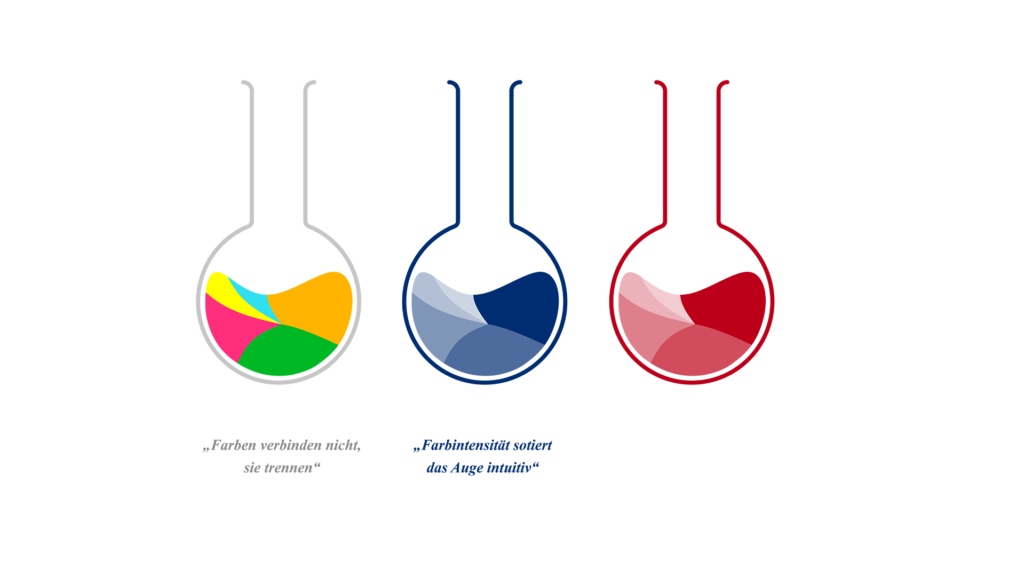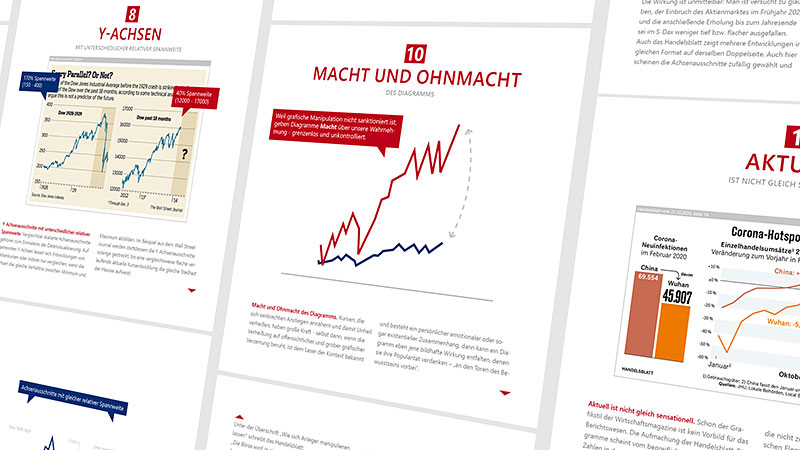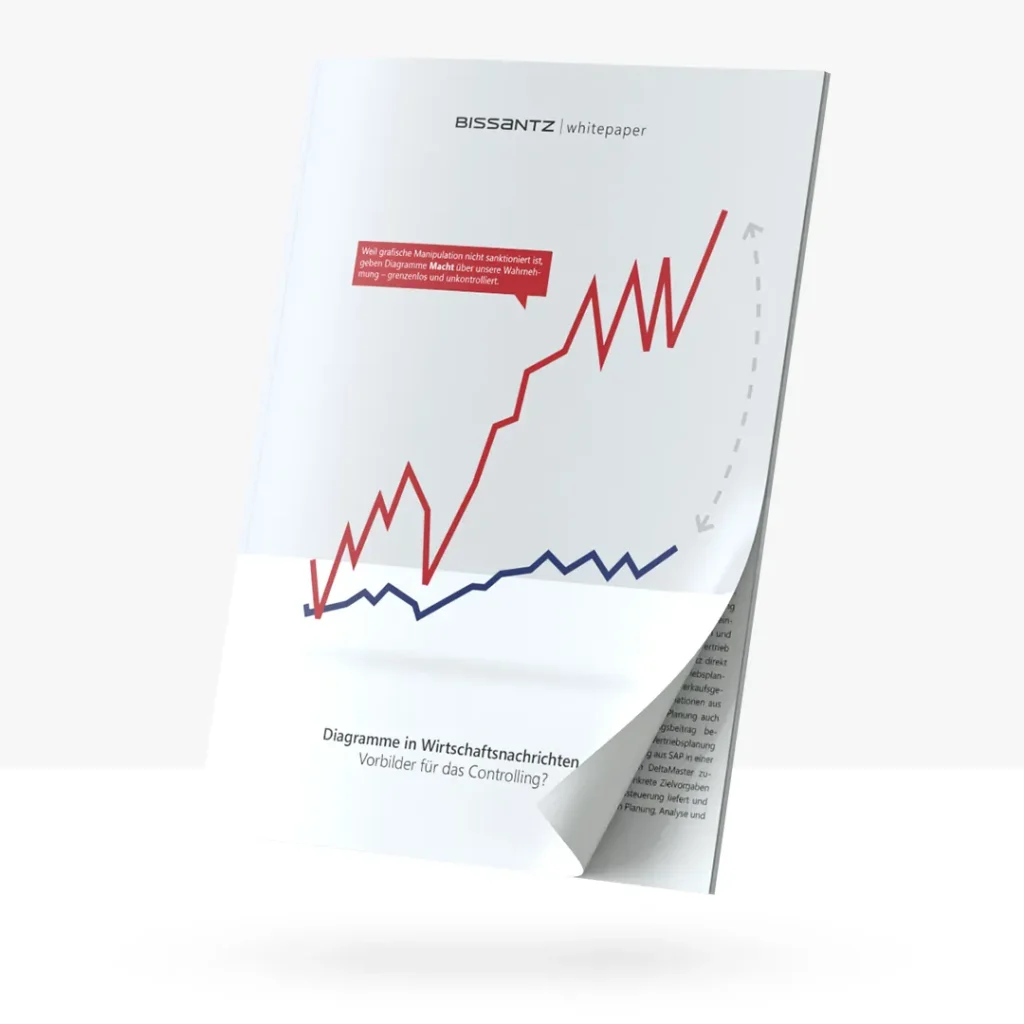Controllers are supposed to be consultants. Their reports are supposed to have a message – ideally, in the title as well as in the comments and summaries. Today, we’ll learn how to formulate messages appositely with some tips from Wolf Schneider.
My splendid colleague Gerald Butterwegge heads up our corporate communication, issues our “clicks!” and “deltas!” newsletters and is responsible for finding the right words in this blog. The others come from me. He recently attended a seminar hosted by Wolf Schneider, an influential teacher of journalism in Germany. Gerald has been a fan of his for quite some time. Now, I am, too. Just as we defend the number and its integrity, Schneider has been doing the same for the German language – just much longer and better.

Formulating a message consisting of numbers and text is not always as simple as this.
As we have already mentioned a number of times in the past, language and numbers belong together. Today, we thought we would be yet a little more practical and pass on a few recommendations that we have cribbed from Wolf Schneider*, partly adapted for English and translated for financial reporting standards.
- We don’t meet in room four.
An old English grammar rule says “eight, nine, 10 except for decimals (e.g. 3.6)”. But that doesn’t always hold true – in real life or in financial reporting. It is better not to write that our report is from “January first”, our P&L is on “page four”, or that the press conference for our annual results will take place in “room eight”. The calendar, the report, and the room door display the numerals 1, 4, and 8 respectively. - We do not have several 100 employees.
In reports, we generally have precise figures and can write 348. If we don’t know exactly, however, “several hundred” reflects this uncertainty better than “several 100”. Pure psychology. - Our ROI didn’t increase from nine to 13 percent.
And our market share didn’t drop from six percent to 4.8 either. Whenever we compare something, we should write the same things the same way and different things differently – preferably in numerals. - We don’t visit four of our 19 subsidiaries in 18 months.
Watch out with crossed series. Things that belong together should be written the same way (e.g. 19 and 4 subsidiaries). Things that don’t belong together are allowed to be written differently (e.g. eighteen months). Besides using them for the longer numbers in our crossed series, we also use numerals when there are actual numbers on the things that we are talking about. For example: „Today, we sold twenty tires in the 300 to 400 price range; yesterday, we only sold fifteen.“ - Our company has three managing directors.
We haven’t kept much from the original grammar rule, have we? Only that we should spell out in words any small quantities that we don’t want to compare. - Fürth is five miles from here.
If we don’t want to make a comparison, we can do what many publishing houses do. They write as many numbers as possible in words. Someone wrote sixteen books on the topic of leadership culture. Fürth is five miles from here. Berlin has three million inhabitants. The next workshop is in forty days‘ time. We like to write numbers with just a few syllables as words. Most times in financial controlling, however, we want to make comparisons – even when the number that we are comparing is unknown and cannot be given in the same sentence. - Occasionally you can state a record even without a number.
In the limited space of a headline, we sometimes don’t write the actual value as a word or a numeral at all. Instead, we pack data-rich details into the language. Our favorite example is „Australian dollar reaches a 28-year high.“ In this case, the current (and highest) exchange rate was just as irrelevant as the lowest one – and all of those in between. - A number is clearer than clear.
We’ve saved the most important rule till last. If we have numbers, we don’t hide them behind ambiguous terms such as significant, considerable, substantial, or clear.
Wolf Schneider opened his seminar by saying “You write about moderately interesting topics for moderately interested readers.” That, too, we can translate: We have a much better time in management reporting.
* Wolf Schneider, Deutsch fürs Leben, 19th edition, Rowohlt Verlag,
Reinbek 2010, here pp. 144-147.
 "
["post_title"]=>
string(10) "Leistungen"
["post_excerpt"]=>
string(121) "Unsere Leistungen im Überblick: Software und Consulting-Services von der Datenintegration bis zur fertigen BI-Anwendung."
["post_status"]=>
string(7) "publish"
["comment_status"]=>
string(6) "closed"
["ping_status"]=>
string(6) "closed"
["post_password"]=>
string(0) ""
["post_name"]=>
string(10) "leistungen"
["to_ping"]=>
string(0) ""
["pinged"]=>
string(0) ""
["post_modified"]=>
string(19) "2024-07-25 17:36:00"
["post_modified_gmt"]=>
string(19) "2024-07-25 15:36:00"
["post_content_filtered"]=>
string(0) ""
["post_parent"]=>
int(0)
["guid"]=>
string(39) "https://www.bissantz.de/?page_id=107838"
["menu_order"]=>
int(0)
["post_type"]=>
string(4) "page"
["post_mime_type"]=>
string(0) ""
["comment_count"]=>
string(1) "0"
["filter"]=>
string(3) "raw"
}
"
["post_title"]=>
string(10) "Leistungen"
["post_excerpt"]=>
string(121) "Unsere Leistungen im Überblick: Software und Consulting-Services von der Datenintegration bis zur fertigen BI-Anwendung."
["post_status"]=>
string(7) "publish"
["comment_status"]=>
string(6) "closed"
["ping_status"]=>
string(6) "closed"
["post_password"]=>
string(0) ""
["post_name"]=>
string(10) "leistungen"
["to_ping"]=>
string(0) ""
["pinged"]=>
string(0) ""
["post_modified"]=>
string(19) "2024-07-25 17:36:00"
["post_modified_gmt"]=>
string(19) "2024-07-25 15:36:00"
["post_content_filtered"]=>
string(0) ""
["post_parent"]=>
int(0)
["guid"]=>
string(39) "https://www.bissantz.de/?page_id=107838"
["menu_order"]=>
int(0)
["post_type"]=>
string(4) "page"
["post_mime_type"]=>
string(0) ""
["comment_count"]=>
string(1) "0"
["filter"]=>
string(3) "raw"
}
 Dr. Ulrike NeubauerzwissTEX
„Ganze zwei Tage hat Bissantz für den Aufbau des initialen Datenmodells benötigt.“
Dr. Ulrike NeubauerzwissTEX
„Ganze zwei Tage hat Bissantz für den Aufbau des initialen Datenmodells benötigt.“
 Andreas WüstAlmatec
„Abweichungen lassen sich sofort erkennen und ergründen – ad hoc und übergreifend aus verschiedenen Datenquellen.“
Andreas WüstAlmatec
„Abweichungen lassen sich sofort erkennen und ergründen – ad hoc und übergreifend aus verschiedenen Datenquellen.“
 Matthias KrebsVoith
Matthias KrebsVoith
 Johanna GärtnerWENCO
Johanna GärtnerWENCO
 Carlo BearthWürth International
Carlo BearthWürth International
 Thomas SchenkirschAebi Schmidt
Thomas SchenkirschAebi Schmidt
 Carsten DeeckeDierkes Partner
[dynamic_columns id='134501' title='Zusätzliche System Navigation']
Carsten DeeckeDierkes Partner
[dynamic_columns id='134501' title='Zusätzliche System Navigation']














 Ludwig StüweLinxens
Ludwig StüweLinxens
 Melanie RosenbergerScherdel
Melanie RosenbergerScherdel
 Patrick TemeschinkoVoith
Patrick TemeschinkoVoith
